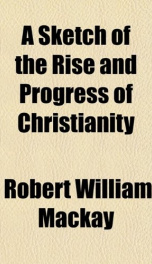a sketch of the rise and progress of christianity

Purchase of this book includes free trial access to www.million-books.com where you can read more than a million books for free. This is an OCR edition with typos. Excerpt from book: PART I. IDEA OF EARLY CHRISTIANITY. 1. Christianity a Reform. Ip it be allowed that the principle best suited to human imperfection is that of reform, it seems a necessary inference that a principle so important ought not to be overlooked by religion; and undoubtedly the Christian religion was originally a reform of that narrow Judaical formalism which, wrapping the mind in its own devices, made it hypocritical or bigoted, and enslaved its powers of thought and action. But since Christianity strove rather to modify than to destroy the prevailing system, and could not at once eradicate the low tendencies of mankind, the old abuses, usurping the name of the religion which should have suppressed them, again crept in, continually calling forth fresh efforts for their reform. And when, from concurring moral and political circumstances, the Christendom of the sixteenth century was split into two camps, and a reformed faith became established through a large part of Europe, perfection was still unattained, and few will pretend, even now, that there is no room for further improvement. Protestantism1 is a good general name for religious reformation. It is the protest of reason and conscience against those superstitious abuses which have ever tended to substitute human precepts for the laws of God; and to confound pure Christianity with forms of worship and church government. To define Protestantism, then, is to define Christianity; it is to verify the possibility of effecting reform by restoration. This, of course, involves an appeal to history; in which, however, iti." especially requisite to guard against those influences of education and sentiment which always make it so difficult to disentangle the really historical from mere prejudice and prepossession. ' It seems unfai...
Info about the book
Author:
Series:
Unknown
ISBN:
1112249869
Rating:
2.5/5 (5)Your rating:
0/5
Languge:
English
Users who have this book
Users who want this book
What readers are saying
What do you think? Write your own comment on this book!
write a commentif you like a sketch of the rise and progress of christianity try:
Do you want to exchange books? It’s EASY!
Get registered and find other users who want to give their favourite books to good hands!


